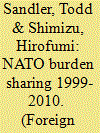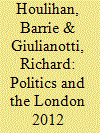| Srl | Item |
| 1 |
ID:
131055


|
|
|
|
|
| Publication |
2014.
|
| Summary/Abstract |
Motivated by US Secretary of Defense Robert Gates' farewell address to NATO, this article investigates whether NATO burden-sharing behavior has changed during the last ten years. Based on a Spearman rank correlation test, we find almost no evidence that the rich NATO allies shouldered the defense-spending burden of the poor allies during 1999-2009. In 2010, there is the first evidence of the exploitation of the rich. When allies' defense burdens are related to defense benefit proxies, a Wilcoxon test finds that there is no concordance between burdens and benefits after 2002. This is indicative of a less cohesive alliance, in which allies are not underwriting their derived benefits. We also find that allies' benefits, which are tied to their exposed border protection and terrorism risk, motivate defense spending. Allies' benefits, based on economic base and population, are less of a driver of defense spending for most NATO allies. We devise a broad-based security expenditure burden that accounts for defense spending, UN peacekeeping, and overseas foreign assistance. In terms of this security burden, there is evidence of the exploitation of the rich by the poor beginning in 2004. Our findings indicate a two-tiered alliance that faces significant policy challenges.
|
|
|
|
|
|
|
|
|
|
|
|
|
|
|
|
| 2 |
ID:
113282


|
|
|
|
|
| Publication |
2012.
|
| Summary/Abstract |
This article traces the emergence of security at the Olympic Games as a key concern of host governments and of the Olympic movement and analyses the implications of this heightened concern for the delivery of the Games, the local host community and for national security policy. It is argued that the Olympic Games, as a high profile media event, provide an increasingly attractive political opportunity structure for a range of political actors-an attraction that is intensified when the Games are held in a world city such as London. Since the 9/11 attacks in New York there has been a sharp increase in security expenditure for the Olympic Games, arguably significantly out of proportion to the likely risk. The cost of security has risen from approximately $108 million in 1996 (Atlanta) to an estimated $1.99 billion in 2012 (London). It is argued that the period since 2001 has been characterized by hyper-insecurity and a culture of intense risk aversion based not on probability but on the possibility of attack. Among the consequences of this development is a desensitization of host nations to the increased securitization of their cities. It is also argued that the impact on the local UK host community of Newham will be significant not only as a result of the intense level of policing, but also owing to the redevelopment associated with the Games and the use of the surveillance infrastructure to create a virtual gated community in the post-Games athletes' village. The article concludes by discussing some of the longer-term implications of the increased securitization of the Olympic Games, including the normalization of intense surveillance, the further encroachment on civil liberties and the growing tension between the values espoused by the Olympic movement and the reality of a successful delivery of the Games.
|
|
|
|
|
|
|
|
|
|
|
|
|
|
|
|